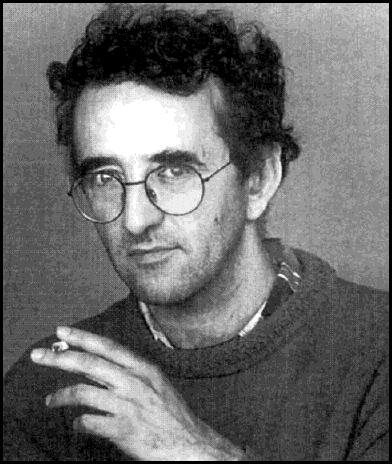1980 - 1998
Roberto Bolaño
Laura Healy, Translator
(New Directions)

- Latin America is the insane asylum of Europe. Maybe, originally, it was thought that Latin America would be Europe's hospital, or Europe's grain bin. But now it's the insane asylum. A savage, impoverished, violent insane asylum, where, despite its chaos and corruption, if you open your eyes wide, you can see the shadow of the Louvre.
"Bolaño por su mismo"
There is e. e. cummings who will, for many of us, be the 20th century's answer to Keatsian romanticism ... but The Enormous Room left us cold. The only ones we could come up with who somehow made the cut were, at the same time, the hoariest: Rudyard Kipling, Thomas Hardy and D.H. Lawrence.
Comes now Roberto Bolaño. We have cited three of his novels on these pages, and By Night in Chile and Distant Star got our highest praise. We stated in our review of Amulet that if our editors permitted us to hand out more stars, this would get them all (golden, glowing).
So we picked up The Romantic Dogs with some trepidation if not trepanation [see below] ... but it is as good a collection of poetry as we have found, with a fine mix of styles.
He was a fan of Federico García-Lorca, and there are echoes here and there:
- The Majorcan boys committed suicide
on the balcony at four in the morning.
Bolaño was also a fan of André Breton, who turns up (improbably) in the eyes of "The Ghost of Edna Lieberman,"
- her eyes are the lighthouse
piercing your silence
Her eyes like the ideal
geography book:
maps of pure nightmare
And your blood lights up
the shelves stacked with books, the chairs
stacked with books, the floor
covered with piled-up books
There are also touches of the imagists, the likes of T. E. Hulme's "Autumn:"
-
A touch of cold in the Autumn night
I walked abroad
And saw the ruddy moon lean over a hedge
Like a red-faced farmer.
I did not stop to speak, but nodded;
And round about were the wistful stars
With white faces like town children.
-
It's 1976 and the Revolution has been defeated
but we've yet to find out.
We are 22, 23 years old.
Mario Santiago and I walk down a black and white street.
At the end of the street, in a neighborhood straight out of a
fifties film, sits the house of Darío Galicia's parents.
It's the year 1976 and they've just trepanned Darío Galicia's skull.
He's alive, the Revolution's been defeated, it's a nice day
in spite of storm clouds advancing slowly from the north,
crossing the valley Darío receives us reclined on a divan.
Nine lines, using none but the simplest words. We're 22. Or is it 23? It doesn't matter. We're in a fifties film (Doris Day? June Alyson? Jimmy Stewart?) A Revolution has been resolved (but we don't know it yet; not do we know which Revolution).
The street is black. Or is it white? Or both: Checkerboard? There are some clouds coming in from the north, but it's a nice day (Have a nice day!) Oh, yes, Darío Galicia. We're going to visit him. He has just been trepanned. Drill a hole in the skull. Let the bad spirits out or, in the case of Revolutionaries, relieve the pressure of those who have been beaten. To let the excess blood and fluids out.
Before we get to see him, there are his parents,
- two people getting along in years, Mr. and Mrs. Squirrel, who, from a green branch suspended in dreams, contemplate how the forest is burning.
And the mother looks at us and doesn't see us or sees
things about us
we don't even know.
The parents, bright-eyed, hovering above, on the still-live branch of the tree (of the family) ... they may see things about us (they are older than us) that we cannot conceive.
- They've trepanned Darío Galicia's skull. Twice!
And one of the aneurysms bursts in the middle of the Dream
His friends say he's lost his memory.
Marío's Dream --- perhaps all memories are now lost. Perhaps the Squirrel family can't or won't say what his friends are saying.
Romantic Dogs contains over forty poems. The translator is Laura Healy. The translations are superb. Some poems are mere scraps --- but almost all contain a gem. This from the long "Last Savage,"
- Of his dark eyes, poets would say: they're like two kites
hovering over the city.
From "Parra's Footsteps" --- a paean to the radical Chilean musician and poet Nicanor Parra ---
- Chile is a long, narrow hallway
Without a visible exit
And this, from the title poem,
- ...sometimes I'd retreat inside myself
and visit the dream: a statue eternalized
in liquid thoughts,
a white worm writing
in love.